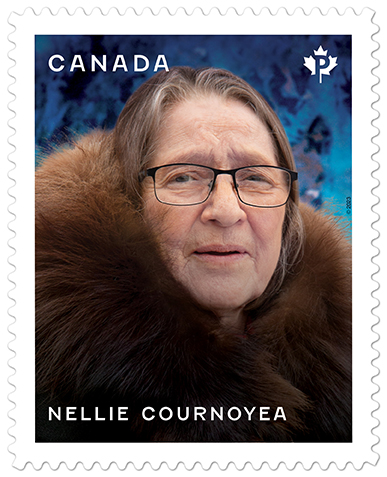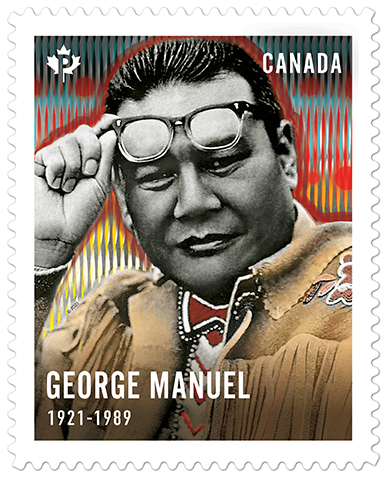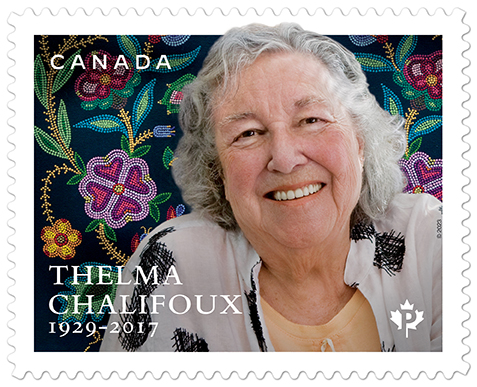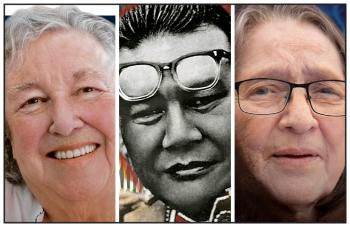Image Caption
Summary
Local Journalism Initiative Reporter
Windspeaker.com
For the second straight year, Canada Post will issue a new series of stamps to honour Indigenous leaders.
Three different stamps, celebrating Nellie Cournoyea, George Manuel and Thelma Chalifoux, will be available for purchase at postal outlets across Canada starting June 21, National Indigenous Peoples Day.
The stamps will also be available for purchase online at canadapost.ca
Cournoyea was the first Indigenous woman to serve as the head of a provincial or territorial government in Canada. She was the premier of the Northwest Territories from 1991 to 1995.
Manuel, a member of Secwepemc Nation in British Columbia, was a political strategist, author and advocate of Indigenous peoples rights. During his political career he focused on uniting Indigenous people at the local, regional, national and international levels.
Chalifoux, who was Métis, was appointed to the Senate by then prime minister Jean Chretien in 1997. While she became the first Indigenous woman to become a Canadian senator, she had a long history in elevating the Métis voice in political circles.
“Canada Post has a history of honouring Indigenous leaders, artists and politicians who have brought positive and lasting changes to Canadian society,” said Lisa Liu, a spokesperson for the Crown corporation.
Those who have been honoured in the past include Metis leader Louis Riel and poet E. Pauline Johnson.
But this year marks the second year that stamps have been created as part of the Indigenous Leaders series. Those in the inaugural set of stamps last year were Harry Daniels, Jose Kusugak and Chief Marie-Anne Day Walker-Pelletier.
“The Indigenous Leaders series, launched in 2022, celebrates and highlights the accomplishments of Indigenous leaders who have made a mark on their communities, be it on the local level, provincially or federally,” Liu said.
Liu added the Indigenous stamps that were released last year by Canada Post were a hit.
“The stamp series and the celebration of each of the leaders were well received by Indigenous communities, and the leaders’ families and friends who we worked closely with on the initiative,” she said.
As for this year, a total of 100,000 booklets will be printed for each of the three stamps. Each booklet contains six stamps.
Each booklet, available at postal outlets across the country, will cost $5.52 plus tax. The stamps are also available for pre-order online, prior to Wednesday’s official release date.
Three separate ceremonies were held at community events recently across the country to announce the stamp release of this year’s three honourees.

For starters, there was an event in the hamlet of Ulukhaktok in the Northwest Territories on June 10 to recognize Cournoyea.
Cournoyea, who is 83, is the only honouree in this year’s Indigenous Leaders series who is still alive.
She completed most of her education via correspondence courses sent to her family’s bush camp.
Before she became a politician she worked as an announcer and station manager for CBC North in Inuvik and as a land claims worker.
Once she entered politics she co-founded the Committee for Original Peoples’ Entitlement. And she helped negotiate the Inuvialuit Final Agreement, which included a land settlement of more than 90,000 square kilometres.
Cournoyea was first elected to her territorial legislature in 1979. Before becoming premier a dozen years later, she held various ministerial portfolios.

An event unveiling Manuel’s commemorative stamp was staged June 12 in North Vancouver.
Manuel, who died in 1989, served as the national chief for the organization now called the Assembly of First Nations, from 1970 to 1976.
He was also the first president for the Union of British Columbia Indian Chiefs and the World Council of Indigenous Peoples.
Manuel spearheaded a movement called the Constitution Express, which lobbied for the inclusion of Indigenous rights in Canada’s Constitution.
His efforts led to the recognition and affirmation of existing Indigenous and treaty rights in the Constitution Act, 1982.
Manuel was also a three-time nominee for the Nobel Peace Prize.

Chalifoux, who died in 2017, had her stamp unveiled at a ceremony on June 13 in St. Albert, Alta.
She had a distinguished career even before becoming a senator. Chalifoux had returned to school after leaving an abusive relationship and she became a fieldworker with the then Metis Association of Alberta, now called the Metis Nation of Alberta.
Chalifoux later co-founded the Slave Lake Native Friendship Centre. She went on to become a land claims negotiator and was involved in constitutional talks in the early 1980s.
Local Journalism Initiative Reporters are supported by a financial contribution made by the Government of Canada.

